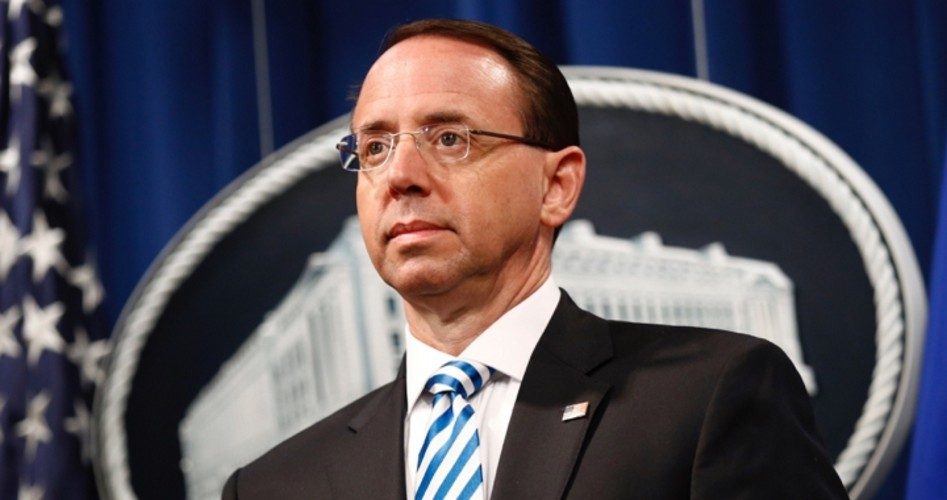
In his resignation letter to the president on Monday, Deputy Attorney General Rod Rosenstein (shown) was all sweetness and light:
I am grateful to you for the opportunity to serve; for the courtesy and humor you often display in our personal conversations; and for the goals you set in your inaugural address: patriotism, unity, safety, education, and prosperity…. The Department of Justice pursues those goals while operating in accordance with the rule of law. The rule of law is the foundation of America. It secures our freedom, allows our citizens to flourish, and enables our nation to serve as a model of liberty and justice of all.
His letter, which announced his resignation effective May 11, sounded corny. He lavished praise on his boss whom he once considered attempting to oust under the 25th Amendment. He didn’t mention anything about the “wire” he allegedly jokingly suggested wearing as reported by the New York Times.
And he most certainly didn’t mention the pain and suffering he unleashed on his boss by giving Robert Mueller virtual free rein to investigate him and anyone in close proximity to the president in an attempt to find something — anything — to hang around his neck and bring him down.
And Rosenstein didn’t say anything about the five articles of impeachment that were drawn up against him last summer after months of his stalling to provide important and likely revealing documents to a House committee.
Now that the Mueller investigation is over, Rosenstein is heading out the door. It’s clear that he wants to put some distance between himself and his past.
On May 17, 2017 Rosenstein appointed Robert Mueller to conduct an investigation into “any links and/or coordination between the Russian government and individuals associated with the campaign of President Donald Trump.” The operative phrase is “any links” — any ties whatsoever in order to find something that Trump or his presidential campaign did that might have violated a law. To make things worse, Rosenstein opened the door even wider, allowing Mueller to investigate any matter that might arise from his investigation.
That it failed — after thousands of hours, hundreds of thousands of documents, and millions of dollars of taxpayer monies — is testimony to just how thin was Rosenstein’s suspicion that Trump colluded with the Russians.
But that’s over now: no need to bring it up again.
When the House of Representatives began to investigate Rosenstein’s role in the affair, he stonewalled. Said Rep. Mark Meadows (R-N.C.) last summer: “For nine months we’ve warned [Rosenstein and the Department of Justice] that consequences were coming, and for nine months we’ve heard the same excuses backed up by the same unacceptable conduct. It’s time to find a new deputy attorney general who is serious about accountability and transparency.”
Meadows and Representative Jim Jordan (R-Ohio) crafted five articles of impeachment against Rosenstein and filed them on July 25, 2018. House Speaker Paul Ryan deep-sixed the motion, and, with all the attention being given at the time to the confirmation hearings of Supreme Court Justice Brett Kavanaugh, they disappeared, never to be heard from again.
It was Rosenstein who signed off on the FISA warrant that was used to harass and surveil Carter Page, severely damaging his reputation while finding nothing. Meadows et al. wanted Rosenstein to show the “probable cause” he used to persuade the FISA judge to allow the DOJ to go after Page. They wanted to know about Rosenstein’s improper authorization of other searches and electronic surveillance. They wanted to quiz him on the misleading statements he made related to the Russia investigation. They wanted to know why he didn’t recuse himself from supervising Mueller when, according to one of the affidavits, “his fairness and objectivity would reasonable be questioned.” They charged Rosenstein with “knowingly and intentionally prevent[ing] the production of documents … in an effort to delay and impede the production of information … relating to … the Department of Justice’s initial investigation into the Trump campaign’s alleged contacts with Russia.”
But thanks to Speaker Ryan, and the convenience of the Kavanaugh confirmation hearings that were sucking all the oxygen out of the air, these questions were never asked and answers never received.
Instead Rosenstein peddled homilies in his letter of resignation, ending it with this:
We keep the faith, we follow the rules, and we always put America first.
As President Harry Truman said: “If you can’t stand the heat, get out of the kitchen.”
Photo of Deputy Attorney General Rod Rosenstein: AP Images
An Ivy League graduate and former investment advisor, Bob is a regular contributor to The New American primarily on economics and politics. He can be reached at [email protected].



